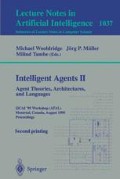Abstract
Intelligent agents, invented in artificial intelligence (AI), are finding application in a number of traditional areas. Classical AI notions such as knowledge and intentions can serve as natural primitives for the specification of agents. However, in order for them to live up to their promise, these notions must be given rigorous definitions. We propose formal definitions for intentions, knowledge, and know-how in a general model of actions and time. Our definitions are conceptually simple and are designed to be modular, in the sense of being orthogonal to one another. Using these definitions, we are able to prove a success result for agents that is akin to the notion of liveness in traditional computing. Others have been able to prove similar results only with the support of rather strong additional assumptions.
Preview
Unable to display preview. Download preview PDF.
References
Michael E. Bratman. Intention, Plans, and Practical Reason. Harvard University Press, Cambridge, MA, 1987.
K. M. Chandy and Jayadev Misra. How processes learn. Distributed Computing, 1:40–52, 1986.
Brian F. Chellas. Modal Logic. Cambridge University Press, New York, NY, 1980.
Philip R. Cohen and Hector J. Levesque. Intention is choice with commitment. Artificial Intelligence, 42:213–261, 1990.
E. A. Emerson. Temporal and modal logic. In J. van Leeuwen, editor, Handbook of Theoretical Computer Science, volume B. North-Holland Publishing Company, Amsterdam, The Netherlands, 1990.
Ronald Fagin, Joseph Y. Halpern, and Moshe Y. Vardi. What can machines know? on the epistemic properties of machines. In AAAI, pages 428–434,1986.
Ronald Fagin, Joseph Y. Halpern, and Moshe Y. Vardi. A nonstandard approach to the logical omniscience problem. In Proceedings of the Third Conference on Theoretical Aspects of Reasoning About Knowledge. Morgan Kaufmann Inc., 1990.
R. Gotzhein and F. H. Vogt. The design of a temporal logic for open distributed systems. In Proceedings of the International Conference on Open Distributed Processing. Elsevier Science Publishers B.V., 1992.
Joseph Y. Halpern. Reasoning about knowledge. In Joseph Y. Halpern, editor, Theoretical Aspects of Reasoning About Knowledge, pages 1–26, 1986.
Carl Hewitt, C. Manning, Jeff Inman, and Gul Agha, editors. Toward Open Information Systems Science. MIT Press, Cambridge, MA, 1991.
Kurt Konolige. A Deduction Model of Belief. Morgan Kaufmann, Inc., 1986.
Kurt G. Konolige and Martha E. Pollack. A representationalist theory of intentions. In IJCAI, 1989.
Dexter Kozen and Jerzy Tiurzyn. Logics of program. In J. van Leeuwen, editor, Handbook of Theoretical Computer Science. North-Holland Publishing Company, Amsterdam, The Netherlands, 1990.
John McCarthy. Ascribing mental qualities to machines. In Martin Ringle, editor, Philosophical Perspectives in Artificial Intelligence. Harvester Press, 1979. Page nos. from a revised version, issued as a report in 1987.
Robert C. Moore. A formal theory of knowledge and action. In Jerry R. Hobbs and Robert C. Moore, editors, Formal Theories of the Commonsense World, pages 319–358. Ablex Publishing Company, Norwood, NJ, 1984.
Leora Morgenstern. A theory of knowledge and planning. In IJCAI, 1987.
Allen Newell. The knowledge level. Artificial Intelligence, 18(1):87–127, 1982.
A. H. H. Ngu, R. Meersman, and H. Weigand. Specification and verification of communication constraints for interoperable transactions. In Proceedings of the 2nd International Conference on Cooperative Information Systems (CoopIS), 1994.
Anand S. Rao. Decision procedures for propositional linear-time belief-desire-intention logics. In IJCAI Workshop on Agent Theories, Architectures, and Languages, August 1995.
Anand S. Rao and Michael P. Georgeff. Asymmetry thesis and side-effect problems in linear-time and branching-time intention logics. In IJCAI, 1991.
Munindar P. Singh. A critical examination of the Cohen-Levesque theory of intentions. In 10th European Conference on Artificial Intelligence, August 1992.
Munindar P. Singh. A semantics for speech acts. Annals of Mathematics and Artificial Intelligence, 8(I–II):47–71, 1993.
Munindar P. Singh. Maintenance and prevention: Formalization and fixpoint characterization. In ECA1 Workshop on Logic and Change, August 1994.
Munindar P. Singh. Multiagent Systems: A Theoretical Framework for Intentions, Know-How, and Communications. Springer Verlag, Heidelberg, Germany, 1994.
Munindar P. Singh and Nicholas M. Asher. A logic of intentions and beliefs. Journal of Philosophical Logic, 22:513–544, 1993.
Munindar P. Singh and Michael N. Huhns. Cooperative information systems: Tutorial notes, 1995. Tutorial given at the International Conference on Distributed Computing Systems and at the International Joint Conference on Artificial Intelligence.
James White. TeleScript technology: The foundation for the electronic marketplace, 1994. White paper.
Darrell Woelk and Christine Tomlinson. The InfoSleuth project white-paper. Technical Report InfoSleuth-95-01, Microelectronics and Computer Technology Corporation, Austin, TX, January 1995.
Michael Wooldridge. Time, knowledge, and choice. In IJCAI Workshop on Agent Theories, Architectures, and Languages, August 1995.
Author information
Authors and Affiliations
Editor information
Rights and permissions
Copyright information
© 1996 Springer-Verlag Berlin Heidelberg
About this paper
Cite this paper
Singh, M.P. (1996). Semantical considerations on some primitives for agent specification. In: Wooldridge, M., Müller, J.P., Tambe, M. (eds) Intelligent Agents II Agent Theories, Architectures, and Languages. ATAL 1995. Lecture Notes in Computer Science, vol 1037. Springer, Berlin, Heidelberg. https://doi.org/10.1007/3540608052_58
Download citation
DOI: https://doi.org/10.1007/3540608052_58
Published:
Publisher Name: Springer, Berlin, Heidelberg
Print ISBN: 978-3-540-60805-9
Online ISBN: 978-3-540-49594-9
eBook Packages: Springer Book Archive

